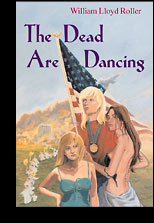|
 "After
you read William Lloyd Roller's The Dead Are Dancing,
America will never seem quite the same ... you begin to
comprehend how deeply this novel penetrates into American
culture and history. Outrageously satiric and utterly
original." "After
you read William Lloyd Roller's The Dead Are Dancing,
America will never seem quite the same ... you begin to
comprehend how deeply this novel penetrates into American
culture and history. Outrageously satiric and utterly
original."
H. Bruce Franklin, author of Vietnam and Other
American Fantasies, John Cotton Dana Professor of English
and American Studies, Rutgers University
see website: andromeda.rutgers.edu/~hbf
"A powerful exploration of the darkest regions of
the American psyche. Approach this novel on tiptoes, and prepare
for a firefight."
C.D. Payne, author of Youth in Revolt and Frisco
Pigeon Mambo
see website: www.nicktwisp.com
"Serious satire, like any serious literature, causes us
to re-examine our own way of looking at things.
Satire is a twisted vision, twisted in such a way that it
forces us to see the deeper meaning in things and to make us
ask questions about ourselves. The Dead Are Dancing
is a shining example. Like Voltaire's Candide,
The Dead Are Dancing is wonderfully entertaining,
utterly absorbing, and disturbingly violent. The image
of America in The Dead Are Dancing is shocking, all the
more so because it will gradually dawn on you as you read it
that what William Lloyd Roller, beneath the delightful
strangeness of his narrative, has uncovered is the sordid and
ugly truth of our recent history. And with a visionary's
clarity, he warns of an even more ugly and sordid future yet
to come."
James N. Frey, author of The Winter of the Wolves
and How to Write a Damn Good Novel
"Novels by mental health professionals risk
collapsing into case studies in which the literary notion of
character is reduced to a character disorder or some other
form of psychopathology.
William Lloyd Roller is an accomplished clinician and group
therapist. He is also a fine fiction writer and chooses
in The Dead Are Dancing, to present this timely and
fascinating exploration of violence and patriotism in the
American psyche through the lens of a novelist's artistry.
Billy Richcreek grows up in a small Illinois town where
war veterans, guns, and patriotism form the core of
working-class culture. Billy becomes a crack marksman as
a child on his father's backyard shooting range, but after
witnessing his father shoot his baby sister in a fit of rage
against his mother, his life changes. He wins celebrity
as a high school football legend. As the Vietnam War
evolves, he has second thoughts about the violence that
permeates the Heartland. Eventually, his earnest search
for personal integrity leads him to stand up to the town
elders and gets him ostracized for protesting a war that just
about everyone else supports enthusiastically.
This totally engaging novel moves quickly through
Billy's coming of age amidst extreme domestic violence, his
parting of ways with a best friend who goes off to war but
soon returns to join Billy as a peace activist, Billy's
struggles with the mores of the sexual revolution and his
less-than-glamorous sexual initiation, his charismatic
leadership of an incipient peace movement, and a fantastic
ending that provides fitting literary closure to the irony,
humor, and timelessness of this poignantly written and
provocative book. Although the reader easily grasps the
novel's relevance to current events, this nuanced and layered
work of fiction never degenerates into the flat realism of an
explicitly cautionary tale.
The Dead Are Dancing raises questions about
conformity and social action. Why did the townspeople
who once cheered for Billy Richcreek as he tore through
opposing football teams turn against him as soon as he
questioned the war? What makes it possible for a Billy
Richcreek to rise above the disapproval of his neighbors and
lead a struggle for peace? Roller does not provide easy
answers, but the way he raises questions makes this book a
solid contribution to our thinking about violence and social
responsibility."
Terry A. Kupers, M.D., is institute professor in the
Graduate School of Psychology at the Wright Institute in
Berkeley, California. He is the author of Prison
Madness, among other works.
"When I began The Dead Are Dancing, I took a
deep, involuntary plunge into a world so exaggerated and
macabre that I had to clean my glasses and start over.
It took a bit, but I finally caught on to Mr. Roller's
distinct style.
It is satire -- but not the sort one might expect from a
G.W. Shaw or Oscar Wilde. No delicate innuendo
here. Roller lays out his characters, his plot, and his
theme in baldest terms. Rolling gunfire, repressed rage,
hero-worship, the trashing of all that's dear to meet an
impossible standard, pressure on young minds to turn them
against themselves, serving Mammon, Baal, and Beelzebub
wrapped in the clothes of politicians.
At times, I felt I was in another "real"
world, not a fantasy at all, it was so compellingly
consistent. At the same time, the author's observations
are sophisticated and insightful, baring human nature with a
sharp knife drawn from stem to sternum, and across the gut,
like the exploratory incisions of a coroner on a corpse.
I was forced to look at the worst parts of myself and my
culture, and the best. I suffered again the confusions
once experienced when I worked hard at being a warrior, while
dismissing, as evidence of cowardice, the peacemaker in
me.
Read it if you dare!
Woody Powell is executive director of Veterans for Peace.
Visit their website at: www.veteransforpeace.org
|


